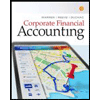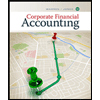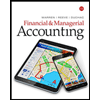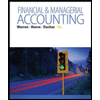
EBK FINANCIAL & MANAGERIAL ACCOUNTING
13th Edition
ISBN: 9780100545052
Author: WARREN
Publisher: YUZU
expand_more
expand_more
format_list_bulleted
Concept explainers
Textbook Question
Chapter 6, Problem 7DQ
Using the following data, how should the inventory be valued under lower of cost or market?
| Original cost | $1,350 |
| Estimated selling price | 1,475 |
| Selling expenses | 180 |
Expert Solution & Answer
Want to see the full answer?
Check out a sample textbook solution
Students have asked these similar questions
None
What is the net income for the year
General accounting
Chapter 6 Solutions
EBK FINANCIAL & MANAGERIAL ACCOUNTING
Ch. 6 - Before inventory purchases are recorded, the...Ch. 6 - Why is it important to periodically take a...Ch. 6 - Do the terms FIFO, LIFO, and weighted average...Ch. 6 - If inventory is being valued at cost and the price...Ch. 6 - Which of the three methods of inventory...Ch. 6 - If inventory is being valued at cost and the price...Ch. 6 - Using the following data, how should the inventory...Ch. 6 - Prob. 8DQCh. 6 - Hutch Co. sold merchandise to Bibbins Company on...Ch. 6 - A manufacturer shipped merchandise to a retailer...
Ch. 6 - Prob. 6.1APECh. 6 - Prob. 6.1BPECh. 6 - Perpetual inventory using FIFO Beginning...Ch. 6 - Perpetual inventory using FIFO Beginning...Ch. 6 - Perpetual inventory using UFO Beginning inventory,...Ch. 6 - Perpetual inventory using LIFO Beginning...Ch. 6 - Perpetual inventory using weighted average...Ch. 6 - Perpetual inventory using weighted average...Ch. 6 - Periodic inventory using FIFO, LIFO, and weighted...Ch. 6 - Periodic inventory using FIFO, UFO, and weighted...Ch. 6 - Prob. 6.6APECh. 6 - Lower-of-cost-or-market method On the basis of the...Ch. 6 - Prob. 6.7APECh. 6 - Prob. 6.7BPECh. 6 - Inventory turnover and number of days' sales in...Ch. 6 - Inventory turnover and number of days' sales in...Ch. 6 - Control of inventories Triple Creek Hardware Store...Ch. 6 - Prob. 6.2EXCh. 6 - Perpetual inventory using FIFO Beginning...Ch. 6 - Perpetual inventory using LIFO Assume that the...Ch. 6 - Perpetual inventory using LIFO Beginning...Ch. 6 - Perpetual inventory using FIFO Assume that the...Ch. 6 - FIFO and LIFO costs under perpetual Inventory...Ch. 6 - Prob. 6.8EXCh. 6 - Prob. 6.9EXCh. 6 - Prob. 6.10EXCh. 6 - Prob. 6.11EXCh. 6 - Prob. 6.12EXCh. 6 - Periodic inventory by three methods; cost of...Ch. 6 - Comparing inventory methods Assume that a firm...Ch. 6 - Lower of cost or market inventory On the basis of...Ch. 6 - Merchandise inventory on the balance sheet Based...Ch. 6 - Effect of errors in physical inventory Missouri...Ch. 6 - Effect of errors in physical inventory Fonda...Ch. 6 - Prob. 6.19EXCh. 6 - Prob. 6.20EXCh. 6 - Prob. 6.21EXCh. 6 - Prob. 6.22EXCh. 6 - Retail method A business using the retail method...Ch. 6 - Retail method A business using the retail method...Ch. 6 - Retail method On the basis of the following data,...Ch. 6 - Gross profit method The inventory was destroyed by...Ch. 6 - Prob. 6.27EXCh. 6 - Gross profit method Based on the following data,...Ch. 6 - FIFO perpetual inventory The beginning inventory...Ch. 6 - Prob. 6.2APRCh. 6 - Prob. 6.3APRCh. 6 - Prob. 6.4APRCh. 6 - Prob. 6.5APRCh. 6 - Prob. 6.6APRCh. 6 - Prob. 6.7APRCh. 6 - FIFO perpetual inventory The beginning inventory...Ch. 6 - Prob. 6.2BPRCh. 6 - Weighted average cost method with perpetual...Ch. 6 - Prob. 6.4BPRCh. 6 - Prob. 6.5BPRCh. 6 - Prob. 6.6BPRCh. 6 - Retail method; gross project method Selected data...Ch. 6 - Prob. 6.1CPCh. 6 - Prob. 6.2CPCh. 6 - Costing inventory Golden Eagle Company begun...Ch. 6 - Inventory ratios for Dell and HP Dell Inc. and...Ch. 6 - Prob. 6.5CPCh. 6 - Prob. 6.6CP
Additional Business Textbook Solutions
Find more solutions based on key concepts
Mary Williams, owner of Williams Products, is evaluating whether to introduce a new product line. After thinkin...
Operations Management: Processes and Supply Chains (12th Edition) (What's New in Operations Management)
1-1. Define marketing and outline the steps in the marketing process. (AASCB: Communication)
Marketing: An Introduction (13th Edition)
Fundamental and Enhancing Characteristics. Identify whether the following items are fundamental characteristics...
Intermediate Accounting (2nd Edition)
E6-14 Using accounting vocabulary
Learning Objective 1, 2
Match the accounting terms with the corresponding d...
Horngren's Accounting (12th Edition)
How is activity-based costing useful for pricing decisions?
Horngren's Cost Accounting: A Managerial Emphasis (16th Edition)
Assume you are a CFO of a company that is attempting to race additional capital to finance an expansion of its ...
Financial Accounting, Student Value Edition (5th Edition)
Knowledge Booster
Learn more about
Need a deep-dive on the concept behind this application? Look no further. Learn more about this topic, accounting and related others by exploring similar questions and additional content below.Similar questions
- What is its DOL? Accounting questionarrow_forwardThe following data were selected from the records of Fluwars Company for the year ended December 31, current year: Balances at January 1, current year: Accounts receivable (various customers) $ 111,500 Allowance for doubtful accounts 11,200 The company sold merchandise for cash and on open account with credit terms 1/10, n/30, without a right of return. The following transactions occurred during the current year: Sold merchandise for cash, $252,000. Sold merchandise to Abbey Corp; invoice amount, $36,000. Sold merchandise to Brown Company; invoice amount, $47,600. Abbey paid the invoice in (b) within the discount period. Sold merchandise to Cavendish Inc.; invoice amount, $50,000. Collected $113,100 cash from customers for credit sales made during the year, all within the discount periods. Brown paid its account in full within the discount period. Sold merchandise to Decca Corporation; invoice amount, $42,400. Cavendish paid its account in full after the…arrow_forwardI want the correct answer with accountingarrow_forward
arrow_back_ios
SEE MORE QUESTIONS
arrow_forward_ios
Recommended textbooks for you
 Corporate Financial AccountingAccountingISBN:9781305653535Author:Carl Warren, James M. Reeve, Jonathan DuchacPublisher:Cengage Learning
Corporate Financial AccountingAccountingISBN:9781305653535Author:Carl Warren, James M. Reeve, Jonathan DuchacPublisher:Cengage Learning Corporate Financial AccountingAccountingISBN:9781337398169Author:Carl Warren, Jeff JonesPublisher:Cengage Learning
Corporate Financial AccountingAccountingISBN:9781337398169Author:Carl Warren, Jeff JonesPublisher:Cengage Learning Financial & Managerial AccountingAccountingISBN:9781337119207Author:Carl Warren, James M. Reeve, Jonathan DuchacPublisher:Cengage Learning
Financial & Managerial AccountingAccountingISBN:9781337119207Author:Carl Warren, James M. Reeve, Jonathan DuchacPublisher:Cengage Learning Financial & Managerial AccountingAccountingISBN:9781285866307Author:Carl Warren, James M. Reeve, Jonathan DuchacPublisher:Cengage LearningPrinciples of Accounting Volume 1AccountingISBN:9781947172685Author:OpenStaxPublisher:OpenStax College
Financial & Managerial AccountingAccountingISBN:9781285866307Author:Carl Warren, James M. Reeve, Jonathan DuchacPublisher:Cengage LearningPrinciples of Accounting Volume 1AccountingISBN:9781947172685Author:OpenStaxPublisher:OpenStax College Intermediate Accounting: Reporting And AnalysisAccountingISBN:9781337788281Author:James M. Wahlen, Jefferson P. Jones, Donald PagachPublisher:Cengage Learning
Intermediate Accounting: Reporting And AnalysisAccountingISBN:9781337788281Author:James M. Wahlen, Jefferson P. Jones, Donald PagachPublisher:Cengage Learning

Corporate Financial Accounting
Accounting
ISBN:9781305653535
Author:Carl Warren, James M. Reeve, Jonathan Duchac
Publisher:Cengage Learning

Corporate Financial Accounting
Accounting
ISBN:9781337398169
Author:Carl Warren, Jeff Jones
Publisher:Cengage Learning

Financial & Managerial Accounting
Accounting
ISBN:9781337119207
Author:Carl Warren, James M. Reeve, Jonathan Duchac
Publisher:Cengage Learning

Financial & Managerial Accounting
Accounting
ISBN:9781285866307
Author:Carl Warren, James M. Reeve, Jonathan Duchac
Publisher:Cengage Learning

Principles of Accounting Volume 1
Accounting
ISBN:9781947172685
Author:OpenStax
Publisher:OpenStax College

Intermediate Accounting: Reporting And Analysis
Accounting
ISBN:9781337788281
Author:James M. Wahlen, Jefferson P. Jones, Donald Pagach
Publisher:Cengage Learning
INVENTORY & COST OF GOODS SOLD; Author: Accounting Stuff;https://www.youtube.com/watch?v=OB6RDzqvNbk;License: Standard Youtube License